 Petzlover
Petzlover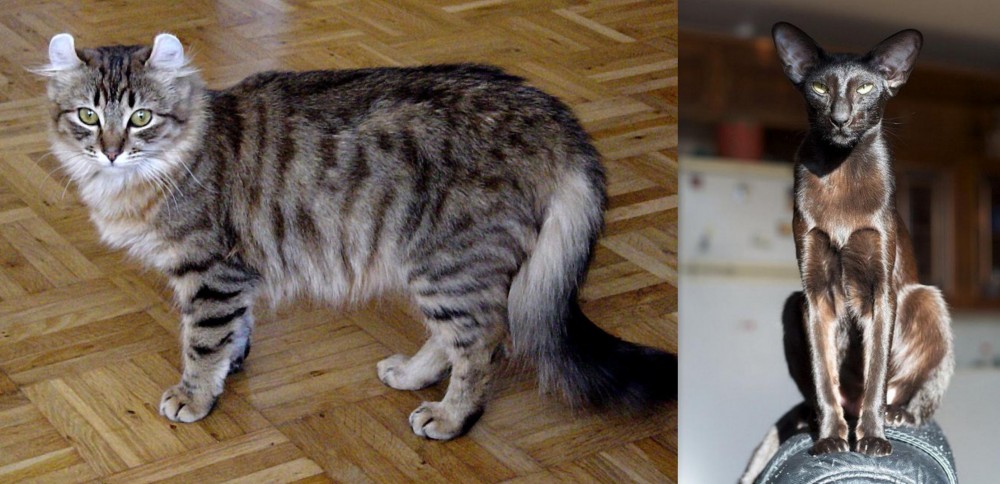 American Curl is originated from United States but Oriental Shorthair is originated from United Kingdom. Both American Curl and Oriental Shorthair are of same weight. Both American Curl and Oriental Shorthair has same life span. Both American Curl and Oriental Shorthair has same litter size. American Curl requires Moderate Maintenance. But Oriental Shorthair requires Low Maintenance
American Curl is originated from United States but Oriental Shorthair is originated from United Kingdom. Both American Curl and Oriental Shorthair are of same weight. Both American Curl and Oriental Shorthair has same life span. Both American Curl and Oriental Shorthair has same litter size. American Curl requires Moderate Maintenance. But Oriental Shorthair requires Low Maintenance
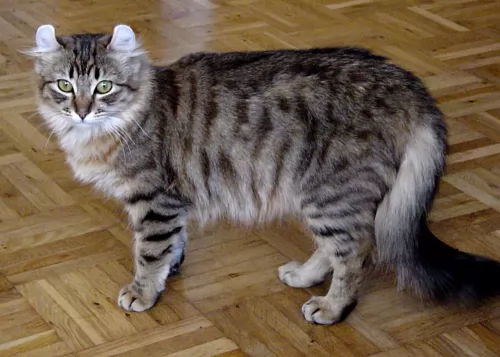 The American Curl is well known for its unusual shaped ears and for being one of the youngest cat breeds.
The American Curl is well known for its unusual shaped ears and for being one of the youngest cat breeds.
It developed in California. The first of these cats appeared to have been strays that arrived in California in 1981. The black female’s name was Shulamith, and she gave birth to a litter with the same curled ears, and was the ancestor of the American Curls of today.
Appearing in a cat show in 1992 for the first time, the longhaired American Curl was then given championship status by TICA and it was also admitted to the Cat Fanciers Association’s championship class in the long- and shorthaired divisions.
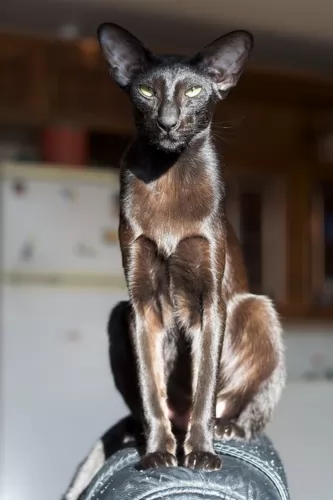 This domestic cat is also related to the Siamese Cat. Orientals come from a diverse group of cats, but they have their foundation in the Siamese breed.
This domestic cat is also related to the Siamese Cat. Orientals come from a diverse group of cats, but they have their foundation in the Siamese breed.
The cat was imported from Thailand to the UK during the 1800s. This particular cat was accepted as an actual breed in 1977. Quite a few of the top cat organizations recognize the Oriental Shorthair but as a Siamese.
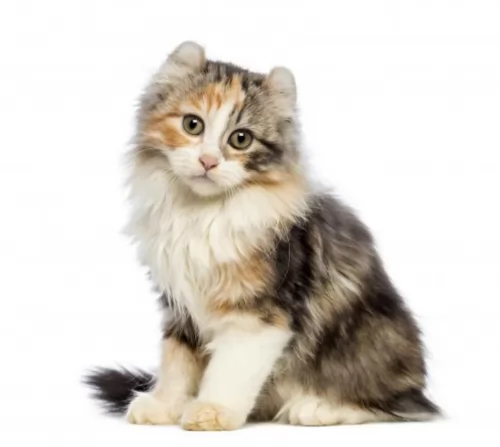 The American Curl is a medium-sized cat weighing roughly 2.3–4.5kg. Its a cat that stands between 21 and 27cm in height.
The American Curl is a medium-sized cat weighing roughly 2.3–4.5kg. Its a cat that stands between 21 and 27cm in height.
It’s also a cat that takes a fairly long time to mature, reaching maturity about 2 or 3 years of age. The most distinctive feature of this cat is its unusual ears that curl backward as opposed to standing up like most other cats. At birth the ears are straight but they gradually start curling back, staying in a tight bud position.
The American Curl's coat is soft and silky and doesn’t require too much grooming. The fur comes in colors such as grey, white, apricot, black, and the coat can be a solid color or in a host of different patterns such as bi-color, triple-color, tabby, ticking and others.
The head is round, the eyes of the cat are large, giving the cat an alert, friendly look. The eyes can be many different colors from blue to green, amber, copper, hazel, and yellow.
The American Curl Cat loves his human family and gets on well with children too. He is an adaptable cat, settling into different lifestyles. You’ve got to watch him around small children who might manhandle him and pull his sensitive ears.
Nonetheless, he is sociable and loving. He is an intelligent cat, being active and alert and will even follow you around to see what you’re doing that he can be involved in too. He isn’t a particularly talkative breed but he loves to play and can even learn to fetch a smallish ball.
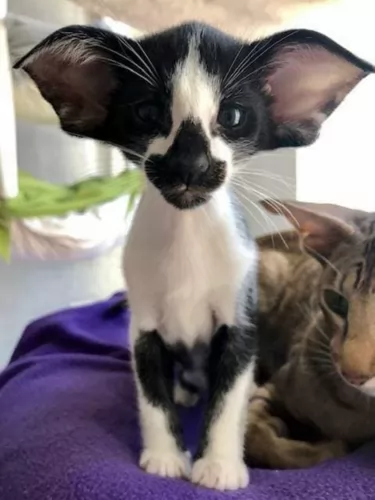 The Oriental Shorthair has a longish head with a slender neck and large ears. The legs are long and slender. The medium-sized cat weighs in the region of 3 – 5kg.
The Oriental Shorthair has a longish head with a slender neck and large ears. The legs are long and slender. The medium-sized cat weighs in the region of 3 – 5kg.
The eyes can be blue or green. Sometimes the cat will have one blue eye and one green eye. The coat is short and smooth and can be in a host of different colors.
The Oriental Shorthair is a curious, intelligent cat and they’re talkative too, loving to have conversations with their human family. They are cats that absolutely want to be part of the family. They don’t want to be left alone for too long either and get on well with children and pets in the home.
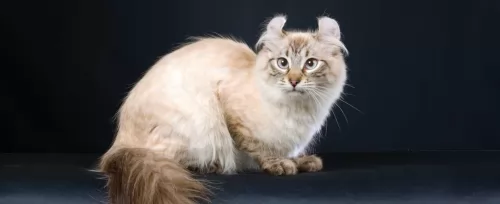 You’ll find your American Curl to be a friendly, loving cat that will easily bond with his human family. They’re adaptable cats and will happily adjust to your lifestyle.
You’ll find your American Curl to be a friendly, loving cat that will easily bond with his human family. They’re adaptable cats and will happily adjust to your lifestyle.
Despite their affection, however, American Curls aren't the type of cats to want to be pampered and petted - they are quite happy just to sit next to their owner and relax, or play with their toys.
Because American Curls are highly adaptable, they're suitable for a number of different home types, and homes with other pets or children, making you a splendid feline pet and companion.
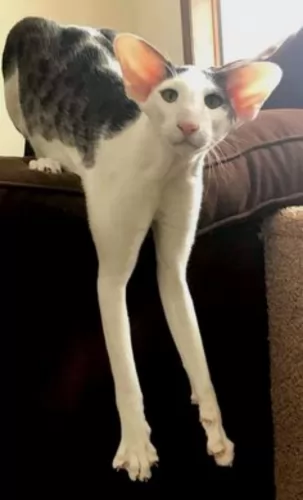 The Oriental Shorthair promises to be an active companion in your life. It’s a cat that likes to involve itself with all the activities that its human family takes part in.
The Oriental Shorthair promises to be an active companion in your life. It’s a cat that likes to involve itself with all the activities that its human family takes part in.
He is a great entertainer too, and he loves all the attention he gets, thriving on being the center of attention.
The Oriental Shorthair cat is slightly more quieter than the Siamese cat but he will still want to tell you what he’s doing and what he wants.
It’s a cat that has many many colors and shades, but the color extends to the cat’s personality. It has a colorful, interesting, inquisitive personality.
The cat is lively and social and will fit in best with a lively, active home where there are also animals to keep him company. By having this loving cat in your home and life, you bring in joy and happiness.
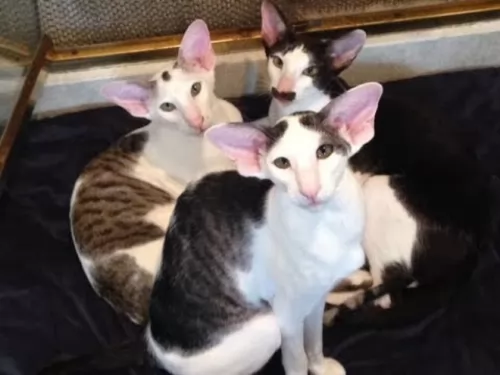 Oriental Shorthairs share some of the same health issues as Siamese cats. Make sure, if your cat shows signs of illness that you have pinpointed a vet in your area.
Oriental Shorthairs share some of the same health issues as Siamese cats. Make sure, if your cat shows signs of illness that you have pinpointed a vet in your area.
Things such as asthma, bronchial disease, lymphoma, neurological disorders, and gastrointestinal problems will need to be seen by the vet.
Think about having your cat spayed or neutered. Not only is this surgery important for preventing unwanted pregnancies, but it can also remove the urge for the cat to roam. The procedure has health benefits for your cat too.
Ensure that your Oriental shorthair has his vaccines up to date. These vaccines are important for preventing your cat from getting some deadly feline diseases. Kittens usually get the first vaccines between the ages of 6 and 8 weeks. Certainly, if you decide to go on holiday and you want to board your cat, the boarding kennels will require that the vet’s card and vaccines are 100% up to date.
Prevent parasites by using a treatment subscribed for your pet by the vet.
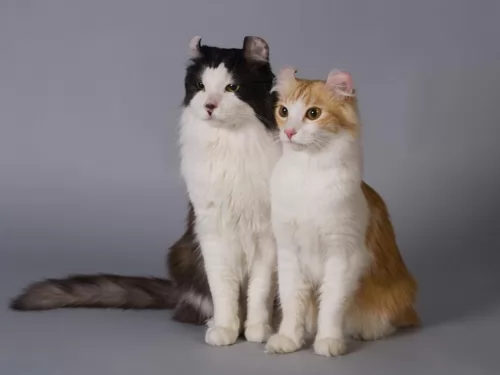 The Curl’s coat can be either short or long, but with a gentle brushing, the coat can be well maintained. The shorthaired variety sheds a bit more during the year than the longhaired variety and this is why grooming and brushing becomes necessary.
The Curl’s coat can be either short or long, but with a gentle brushing, the coat can be well maintained. The shorthaired variety sheds a bit more during the year than the longhaired variety and this is why grooming and brushing becomes necessary.
You can brush your cat’s teeth to avoid periodontal disease.
Trim your cat’s nails every other week if they don’t wear down naturally.
Check inside- and outside the cat’s ears for parasites and dirt. The cat’s ears have a unique shape and they may well be born with narrowed ear canals that can trap dirt and wax and this results in ear infections.
Like all cats breeds, your lean, muscular American Curl can be susceptible to obesity and heart disease. Speak to your vet about a special cat food for your feline friend as cat food is specially formulated to deliver the exact level of natural vitamins, minerals, fiber and antioxidants needed. Understand the amount of food your Curl requires by checking out the feeding instructions on the food labels. Always talk to your vet if you're not sure how much and what you should feed your cat.
Remember, that if you don’t want to do these grooming routines for your cat for fear of hurting him or not doing it properly, the vet or your local pet groomer will do it for you.
Make sure to provide your intelligent American Curl with toys and exercise. You can buy toys and games that will challenge his mental and physical abilities.
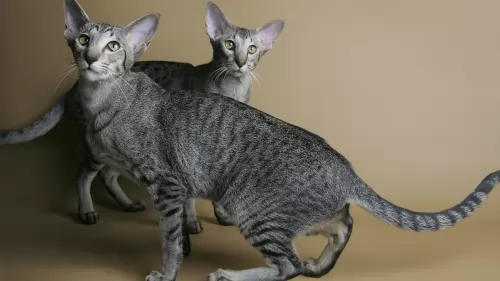 The short glossy coat doesn't shed much and the cat is considered low maintenance. A brush once a week will be adequate. A wipe down with a damp cloth will keep the cat dust-free and shiny.
The short glossy coat doesn't shed much and the cat is considered low maintenance. A brush once a week will be adequate. A wipe down with a damp cloth will keep the cat dust-free and shiny.
Just doing this for your cat is good for the cat’s morale as he thrives on attention, relishing the human interaction he gets during grooming.
Trim his nails, particularly if he is an indoor cat.
Keep your Oriental Shorthair lean and mean by not overfeeding him. The cat’s build is designed for slimness and he won't do at all well with the extra weight. The extra weight can lead to lots of health problems, one of which is diabetes.
If in any doubt as to how much to feed your cat, consult your vet about portion sizes. There are excellent commercially manufactured cat foods on the market, and the manufacturers know that cats are carnivores and that the best cat goods are high in protein.
Avoid giving your cat any kind of human food. Never leave him without a constant supply of fresh, cool water.
Provide your cat with a litter box and keep the box free of cat droppings. You can invest in small rakes from the pet shop and they make it easy to rake up the feces and dispose of them. Change the litter regularly too.